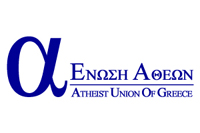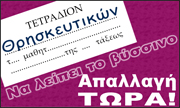Last night, I went to go see Corpus Christi. The reason I wanted to go and see this particular play was my desire to support the right of artists to freedom of expression. I never imagined I would face so many difficulties and dangers in this simple task.
I took the subway, got off at Kerameikos Station, and walked from Konstantinoupoleos Street towards Iera Odos, where the theater is located. From the previous intersection, I could see that a large crowd had gathered and the special forces of the police had blocked off the street. I turned right and made my way to Iera Odos from the previous street. In front of the theater, another crowd had gathered, and another group of policemen was preventing them for approaching. Behind the police, there were a few people, priests, monks, a lady with a scarf on her head and some men in suits, three of which, as I learned later, were parliament members of the Golden Dawn party.
The air smelled of tear gas and my eyes stung, but generally there was relative calm. I approached the officers and said that I wanted to enter the theater.
“Go away, ma'm. Please, go away”
“Has the play been cancelled?”
“We don’t know. Please step back.”
I did step back, but I didn’t leave. I tried, in vain, to locate my friends with whom we had arranged to meet. I walked around the ring of police officers, trying to get through, all the while explaining that I wanted to enter the theater to see the show, but without success. My efforts, and the Atheist Union t-shirt I was wearing, attracted the attention of protesters who started to comment:
“What does she want? To see the play?”
“She's a lesbian and wants to see the fags?”
“Look at her t-shirt! Atheist Union!”
“She's an atheist!”
Their interest turned onto me and they started talking, their words mostly full of tension: logical fallacies, insults and threats. I tried to stay calm and steady, to respond rationally and coolly, and to engage the others, and while I succeeded, I can not say the same thing for them. I will try to convey some of the comments here, somewhat out of order, because I can no longer remember exactly who said what, with a few exceptions.
“Go away, you fucking commie!”
“Why did you come? To see the fags? What are you, a lesbian?”
“It’s none of your business.”
“She's a lesbian, don't you see? You have no man with you, no children, no grandchildren, you're a lesbian!”
“Look at the t-shirt, she's an atheist! Get the hell outta here!”
“I want to see the play.”
“You want to see the faggots? They're faggots! Perverts!”
“They swear against our Christ, our Virgin Mary!”
“How do you know? Have you seen it?”
“No, but so they told me. They told me it swears against our Christ. It must be banned!”
“If you don't want to see the play, don't. Why shouldn't I?”
“They blaspheme against our God! We have the one true God!”
“He'll strike you down with lightning and burn you! You’ll see what God will do to you!”
“Since God will do it, why are you worrying about it? Go home, rest, and trust in God.”
“You’ll go to Hell!”
“There is no God, nor is there a Hell.”
“There isn't? Then I won't talk to you, you're not worth it.”
“I want to talk to you. I believe you are worth it.”
“Hey, don’t waste your time on her, she’s not worth it. She’s trash.”
“Get out of here, Albanian!”
“I'm Greek.”
“Greek? True Greeks don't do such things! You're Albanian!”
“You're trash! May God have mercy on you.”
“Is this the religion of love?”
“Christ threw out the merchants from his house with a whip! That’s how we’re going to throw you out!”
“This isn’t a church, this is a theater. You are stopping us, not the other way around.”
“Christ said, “I did not come to bring love, but a sword”. He said, “Bring me my enemies, and slay them before me!””
“In other words, you want to slay me?”
“Listen here, bitch, we are Greek Christian fascists! 90% of Greeks are Christian fascists, understand? As a fascist, i have the right to tell you to get out of here.”
“As a fascist, you have the strength, but not the right.”
More shouting, more insults, more irrationality. Blind rage and hate, hate speech full of bile.
You need to get laid, you're not properly laid, you’re a woman and you need a spanking, would that Papadopoulos were back... The women seemed to be more fanatic. Most were middle aged, but there were both older and younger women there. The woman with the scarf on her head, near the MPs, was one of the most angry ones. When she spoke to me, she stood so close to me that I could feel her saliva on my face. I told her many times, very calmly:
“Please step back a little. Please, speak more slowly, so that I can hear you better.”
It was no use, nor could I reason with the gentleman who claimed that we are "90% Christian fascists."
“Speak more slowly, please. I can’t hear well like this.”
“I have a strong voice!”
I wish I could tell them: I am not a lesbian, but even if I were, what would it matter? I have a husband and a child, but even if I didn’t, what would it matter? I'm not Albanian, but even if I was, what would it matter? I’m not a communist, but even if I was, what would it matter? I don’t believe in God, but what does it matter? Some people have a different opinion about God and Christ and the Virgin Mary -- what does it matter? You demand respect for your right to believe in God as you like, why don’t you respect others’ rights to believe in a different way, or not to believe at all?
In the meantime, the ring of police had loosened. I tried to approach the theater again. Through the gate, I saw a man coming toward us. I assumed it was someone involved with the play that had come to open up to let the audience in. I started to speak to him, but a tall, fat, bulky man -- someone told me later that he was Ilias Panayotaros, a Golden Dawn MP -- came toward me and told me to leave.
‘I don't want to leave, I want to see the play.”
“Get outta here, you fuckin' lesbian, you fuckin' commie, or I'll smack you!”
It was impossible to go around him. He pushed me with his body, stepping towards me, forcing me to retreat. Another man who was with him and approached me and he pushed me as well, both physically and verbally. He leaned over me and pushed me with his body. People around me encouraged me to leave.
“Get out of here, now, or you'll get beat up, don't you see what's going on here?”
“I don't want to leave. I won't submit to violence. I have a right to be here. I have a right to see the play.”
I tried to stand my ground. I tried to talk with the others, but to no end. The theater stayed closed with the police in front. My friends were nowhere to be seen. I wanted to stay calm, but I felt upset, more and more lonely and tired. After a little while, I went to stand by a kiosk, a few meters from the entrance. I walked towards the back, in between the magazines and the potato chips. Another couple was there who had come to see the show and had fled, like me, for the safety of the kiosk. I had a calm, logical and coherent chat with them. Their presence helped me. Soon I felt better, my heart heartbeat came back to normal.
We talked a bit, commenting on bigotry blind fanaticism. We wondered why there were three MPs of the Golden Dawn there -- Panayotaros, Lagos, and Pappas -- and no MP from any other party. Why were there only fanatical religionists, and no defenders of the intellect and of freedom of expression? We made some phone calls to radio stations and journalists, begging them to inform as much of the mass media, and as many politicians, as they could about the situation.
After some time, we went out again. The same pattern repeated every so often. The ring of police formed again. The police pushed everyone away, except for the MPs who were standing within the ring. At one point there was a commotion and journalists and cameras approached. A few MPs from SYRIZA and DIMAR parties had arrived. I believe they were Tatsopoulos, Repousis and Katrivanou. I also heard that Dritsas was there but I’m not sure -- I don’t know them all by sight. They made a few statements. There was some talk of opening the theater so that only the MPs could enter, so that the protesters “wouldn’t get their way”. “What’s the point of that?” I thought. The point is for the public to enter and the show to go on. It’s no victory for just the MPs to enter.
Time passed, the situation remained unchanged. I heard that the actors feared -- and rightly, in my opinion -- that if they opened to doors for the public, the religionists would enter with the pretext that they wanted to see the show, and then create problems, in all probability with the Golden Dawn MPs in the front line. So the doors stayed closed. The protesters did not leave, but neither did we. Every so often, we asked the police if the show would go on, and their answer was a consistent, “We don’t know yet”. At one point, I saw Ioanna Kurtovik in front of me, speaking to the police:
“Aren't these people disturbing the peace? Why don't you remove them? Why won't you do something?”
I didn’t hear the answer, but I saw what they did, in practice: nothing.
I felt adrift. Initially I wasn’t afraid, but as time went by, there were moments when my courage failed me. I remembered my husband, who’s always worrying that I’ll come across fanatics, that something will happen to me, that I’ll get beat up. I thought of my child, sleeping peacefully at home. What if I really got beat up? What if there were more disturbances and we were all arrested? What if I couldn’t lie in my husband’s embrace tonight? What if I couldn’t be there to wake my child for school? I was tempted to leave -- but I said to myself: No. I won’t allow them to chase me away, I won’t allow them to intimidate me. I will stay here and speak with them for as long as I can and then I’ll take a breather and speak with them again, even if they don’t listen, even if they don’t seem to listen, even if they refuse to listen. If even a single person listens to the things I say, perhaps they will retain something. If not that person, then maybe someone who happened to hear the conversation. Even if nobody listens to me, I will feel better about myself only if I speak up, only if I stand up to them. Calmly, politely and steadily.
In the meantime, I located some of my friends. At some point, I spotted someone I knew, then another. I started talking to people again, with journalists, with people I knew and people I didn’t, with people who wanted to see the play and with protesters. I struck a conversation with a gentleman who had come to protest the play.
“This play insults Christ.’
“What can I say... I don’t know, I haven’t seen it.”
“I have. I don’t judge something I haven’t seen.”
“Then why do you deprive us the right to see and judge for ourselves?”
“I’m the one stopping you?”
“Well, of course, since you won’t let us see it!”
“How am I not letting you see it? Go and see it.”
“But aren’t you demanding for the play to be banned?”
“Yes, I want it to be banned.”
“Why?”
“Because it insults Christ and the Virgin Mary!”
“Why don’t you describe it to me, so I can know exactly what’s in it.”
“It shows Christ on the cross and twelve Apostles dancing. It showed Judas with Christ, that Judas had an affair with Christ. It speaks of affairs between men. It shows the Virgin Mary pregnant and about to deliver. A man plays Mary. They ask her, ‘Where’s your husband’ and she says, ‘He’s parking the car’...”
“It’s a different perspective on Christ and the Virgin Mary, just not yours.”
“It’s a blasphemous play! It blasphemes against my faith!”
“And why shouldn’t it?”
Right then, he became confused. Up to that point, he was calm and talkative. Then he tensed up.
“What are you saying? Why shouldn’t it blaspheme? How can you ask why?”
“Blasphemy is the questioning of dogma. If you don’t want to question it, that’s fine. Why shouldn’t someone else question it? You believe, I don’t. Why shouldn’t I question it?”
“You mean you don’t believe in God?”
“No.”
“Then we cannot talk! We don’t believe the same things!”
He turned his back and strided away.
“We don’t believe the same things, but we can still talk!”
“No. we can’t!”
“We must be able to talk! We’re fellow beings, fellow citizens, we live in the same country, the same planet. We must be able to talk to each other!”
And yet we couldn’t.
More people, more opinions.
“Why do you swear against our Christ? Do you want us to call your mothers names?”
“I’m not calling anybody names. I just want to see the play.”
“The play swears against our Christ. Do you want me to produce a play calling your mother names?”
“My mother, like yours, is a real person. Christ and the Virgin Mary are ideas and exist only in your head.”
“What are you saying! Christ is my brother!”
“Your brother is one thing, Christ is another. One is a human being, the other, a belief. It’s one thing insulting your family, and another, your beliefs.”
“Tell me, would you like me to insult your beliefs?”
“Be my guest! Make as much fun of them as you want!”
“Is that so? Why don’t you try cursing Mohammed in front of Muslims and see what they’ll do to you?”
“And that means you have the right to do the very same thing to me?”
Nada, dead end.
At least some of them were speaking to me. Some would even listen, like the man who was watching me speak to those Christian maniacs that used the foulest of language.I turned to him and asked,
“Do you believe in God?”
“Yes.”
“Look at these people. Do you think that right now they're being inspired by the spirit of God?”
I asked the same question of the priests who were there with crosses in their hands. They, at least, weren’t cursing or threatening, but they made no attempt to restrain their flock.
“You are a priest. Please tell me, do you approve of what's happening here? Do you approve of this behavior? What are you doing to prevent it?”
Silence, complete indifference.
Most disheartening of all, though, more than the insults and the threats and shoving, were the suggestions of police officers, the journalists, the people who had come to see the play, the few protesters who were trying to calm things down, and even a passer-by:
“Let it go, better let it go.”
“Go away, step back, let them be.”
“Don’t you get it? Let them be. Don’t you see what’s going on?”
“Let them be, child, they can’t be reasoned with.”
“ Leave, let it go. Leave. Let it go.”
They took me by the hand and softly tried to pull me away. They offered friendly, protective smiles.
No, I won’t leave, I won’t let it go. I have a right to be here. I have a right to a different opinion. I have the right to see a play of my choosing. I have the right to do all this, even if some people feel offended, even if some are annoyed, even if they try to push me away by force, having exhausted all legal means, since the charges against the producers were deemed baseless and the restraining order illegal. And I will exercise my right and will not allow violence and bullying discourage me.
If I let it go, if I step back, they will take up the space I leave and advance a bit more. If take a step back, they will feel a bit stronger and will feel their actions are justified. If I leave, they will stay and spread out, so there’s no more room for me. If I don’t stay put now, at some point I won’t be able to leave my home, and sooner or later they will reach into my own home.
That is why I mean to stay. I will be myself, with my views, in my land. I am not leaving.
I am who I am; and I am here.
To stay.
Greek version of the article
Translated by toomanytribbles and EvanT









